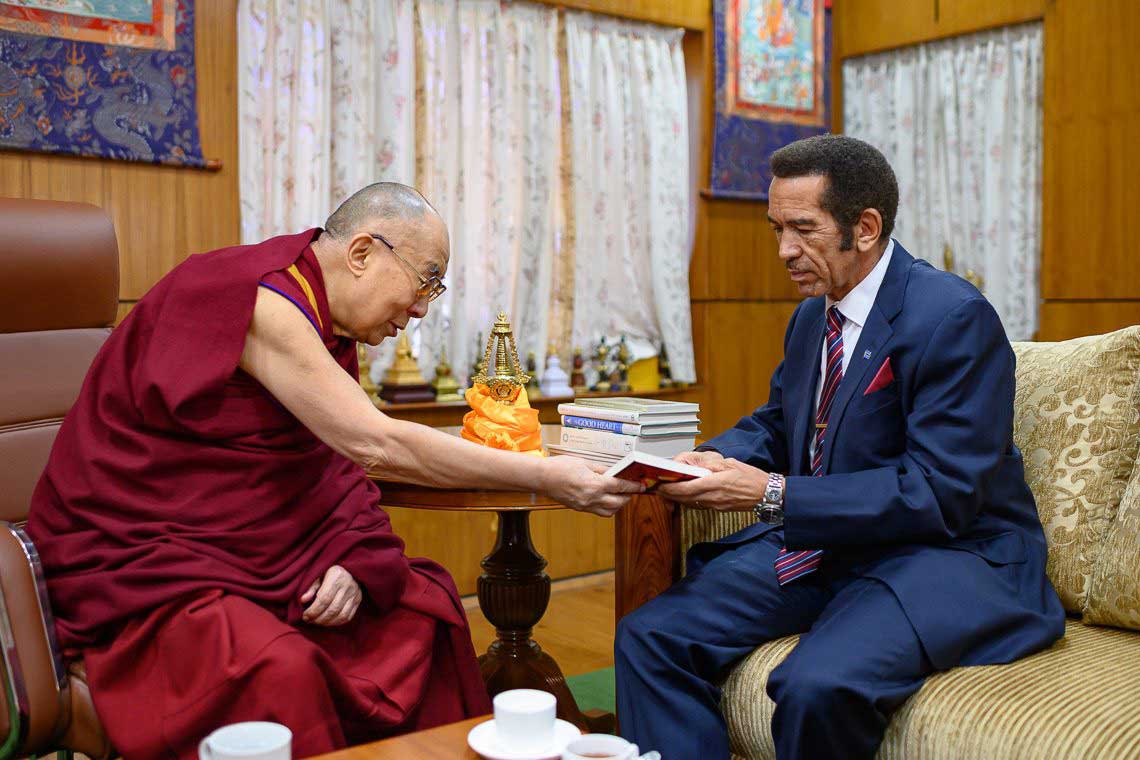- China helpless and vulnerable as Khama defies gov’t advice on Dalai Lama
- China confused as to who to direct bargaining power to between Khama and gov’t
- Botswana gov’t says China has not asked or said anything about the Dalai Lama saga
TEFO PHEAGE
The government and former president Ian Khama’s differences have weakened the Republic of China’s crackdown policy on defiant states or individuals who associate with the Tibetan leader-Dalai Lama after the government of Botswana’s open denouncement of Khama’s trip to the Tibetan leader. Khama was invited as a guest of honour for the Tibetan 60th anniversary of an abortive 1959 uprising against Chinese rule.
Government sources reveal that the government decision to denounce Khama’s trip has created a difficulty for China in devising a counter-strategy, “they did not know who between the government or Khama to target. Normally the Chinese government targets states through trade sanctions, aid withdrawals or threats but the government of Botswana had clearly communicated its position on the matter,” said a source close to the Embassy officials.
On prior occasions Botswana was forced to explain its romance with the Tibetan leader and under the leadership of Khama, government gave China the finger calling the economic giant to respect its sovereign right.
In the current saga, the Chinese hands appeared to be tied behind their backs by the Botswana government’s all out attempt to play by the book and avoid rocking the diplomatic boat.
The Permanent Secretary to the president, Carter Morupisi says they have not heard anything from China, “you will have to speak to the Ministry of Foreign Affairs and International Cooperation but as far as I am concerned there has not been any inquiry or communication from the Chinese government in relation to the Dalai Lama,” he said.
This was confirmed by the Minister in the Ministry of Foreign Affairs, Unity Dow who said they have not held any discussion with China over Khama or the Dalai Lama. “I have ascertained that the former president’s travel plans to India have not been the subject of any inquiry from the Chinese government. In any event, the agenda and deliberations of any meeting between the Ministry and envoys are not usually matters for public consumption, unless made so by mutual agreement,” Dow said.
Efforts to solicit a comment from the Chinese government were futile as they could not respond to this publication’s inquiry at the time of going to press despite having given undertakings to do so.
Beijing views the Dalai Lama as a dangerous separatist, campaigning for Tibetan independence and consistently condemns foreign governments who welcome him. The Chinese have adopted a hyper-sensitive and uncompromising approach to the Dalai Lama and his mission to liberalize Tibet as an autonomous state.
Dalai Lama and Khama shares similar views on China as a country that lacks the “moral authority” to play a key role on the world stage because of its poor record on human rights, religious freedom, freedom of expression and freedom of the press.
“The sensible Chinese realise China should now pay more attention in this field in order to get more respect from the rest of the world,” Dalai Lama has said.
At the 60th anniversary of an abortive 1959 uprising against Chinese rule in Tibet, Khama reiterated that it is the good innocent men who need support.
“The Dalai Lama’s busy schedule of teaching here and around the world, along with his prolific writings have established him, as a truly global icon for the power of human liberation and compassion. It is little wonder then that international polling in recent years has consistently placed him among the world’s most admired individuals. It therefore defies logic that some still believe that seeking to deny others the opportunity of his physical presence can diminish his influence. Such provocations rather only serve to diminish his would be censors in the eyes of the world as they embark upon human rights violations daily,” said Khama.
Khama went on to add that while Tibetan’s continue with their own long and painful struggles, they can take solace in the fact that in their hearts they remain undefeated, and in their minds they’re already liberated.
While many European leaders have met with the Dalai Lama in the 1990s, the same cannot be said in more recent years, where China has shown that it is capable of exerting pressure even on larger member states such as France and Germany through “soft” sanctions such as blocking ministerial visits and official deals.
In 2011, the Dalai Lama visited Denmark, Estonia, Finland, France, Ireland and Sweden. But the only European head of state who received him was Estonian President Toomas Ilves – and China immediately reciprocated by cancelling official ministerial meetings. ]political leaders no longer dare to meet with the Dalai Lama.




